Editorial
DOI:
https://doi.org/10.12946/rg28/005-008Abstract
Is Rechtsgeschichte – Legal History, now that we have reached the legal age of maturity with our 18th year of publication, settling down to a decorous adulthood? Our table of contents might give that impression. The articles in the Research section deal with topics that have occupied legal historians for decades: disputes between the ›Germanist‹ and the ›Romanist‹ branches of the discipline; the legal literature of the late antiquity, the Frankish Empire and canon law; contracts in medieval and early modern town laws; Austrian public law of the 18th century; the theory of criminal law. The two Foci sections which follow discuss banking and economic law since the early modern period and the work of one of the most prominent German legal historians of the 20th century, Knut Wolfgang Nörr, respectively.
But our readers need not fear that they will encounter only variations on what is already well known. On the contrary: Tamar Herzog, for example, situates the disputes between Germanists and Romanists within the context of Spanish legal historiography, which is hardly known outside the Iberian peninsula. Christoph Meyer rehabilitates the genre of epitomizing literature, which hitherto has been rather confined to the margins of legal historical scholarship. Thomas Pierson’s analysis of the »service letters« of those employed by the Free Imperial City of Frankfurt reveals the potential of this largely unexplored source type. Martin Schennach’s article is a major contribution not only to Austrian but also to European constitutional history, and incidentally presents us with an example of legal pluralism avant la lettre. Finally, Klaus Günther examines the peculiar tension between criminal law and democratic principles that has existed since the Enlightenment, thus building a bridge from legal history to legal theory – indicating a path also for the future of the Frankfurt Max Planck Institute, where just before the publication of this issue, a new department focusing on legal theory has been established.
The Focus on financial markets and regulation, coordinated by Carsten Fischer and Andreas Thier, is equally innovative. The history of these markets since the early modern period is a good example for how public authorities and with them the law have again and again come up against their limits. Legal history in this area is thus in a way the history of the failure of law. This section also inspired this issue’s photo series of objects from the numismatic department of the German Bundesbank. Juliane Voß-Wiegand introduces its collections in the Marginalia section.
The second Focus, edited by Jan Schröder, is devoted to the work of one of the most original and productive members of our profession, Knut Wolfgang Nörr (1935–2018). Few scholars shaped the study of the history of canon law, procedural law and economic law in the second half of the 20th century as much as he did. Reading Schröder’s introduction to the section, the writer of this editorial could not help but think of English constitutional history, which is famously full of people who were »the best prime minister we never had«. Nörr was perhaps the best Max Planck Director that the Frankfurt Institute never had. It comes as a relief that, according to Schröder, Nörr’s decision not to become Coing’s successor was not least due to his preference for »short distances«, which Frankfurt, in contrast to Tübingen, was unable to offer. Nevertheless, the Institute continues to remember him with gratitude, as he remained in close touch with it as an external scientific member for many years.
As usual, the Critique section contains a plethora of book reviews covering all eras and regions of legal history, much that is new and interesting. Many reflect the Institute’s research approaches, formulated by the broad range of researchers who share in our work: from the holder of an Orientation Scholarship to an Emeritus Director, in addition to former colleagues, guests, and other friends of the Institute. This section should furthermore dispel all fears that the Rg will from now on stick to »decorous« topics of legal history. After all, what other legal history journal can claim to have included a discussion of the connection of Campino, front man of German punk rock band »Die Toten Hosen«, to the Prussian Supreme Administrative Court?
Due to the Covid-19 pandemic, this year most of the work of both authors and the editorial team was done from home. I therefore want to thank, also in the name of my co-editor Thomas Duve, all those involved in the preparation of this issue, the authors and our editorial staff, for their efforts in ensuring that we were able to publish this volume in its usual format and on time, despite the challenging circumstances. Our particular thanks go to Juliane Voß-Wiegand and Hendrik Mäkeler of the German Bundesbank’s Department for Numismatics and Monetary History for their cooperation in assembling the series of photos for our printed edition.
Downloads
Published
How to Cite
Issue
Section
License
Copyright (c) 2020 Author

This work is licensed under a Creative Commons Attribution 4.0 International License.





